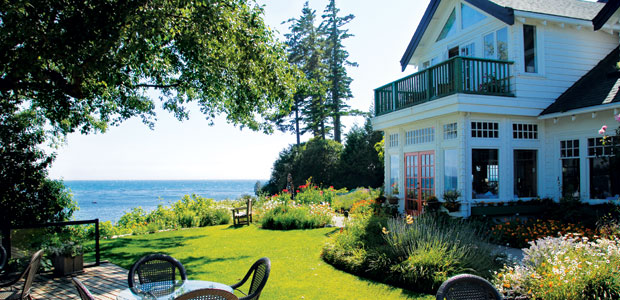Advertisement
Sooke Harbour House
Savouring a connection to source

A pedigreed renegade with a penchant for doing the right thing, Sinclair Philip has called Vancouver Island’s Sooke Harbour House home for long enough to entrench its reputation as one of the country’s most eco-minded retreats.
As the founding president of Slow Food Canada and a passionate proponent of regionally rooted cuisine, Philip, partner Frederique, and Chef Edward Tuson have gained both a reputation and a following.
“Different people think of us as new age, back to the land, and anti-global warming, but that is not intentional in any way,” says Philip who has been adhering to the 100-mile locavore philosophy for several decades. “We lived in France for a while and everything came from our local area. When we came back to Canada, we thought this is exactly what we should be doing here: letting people taste the potential of Canadian regional cuisine.”
With a wealth of accolades that range from their winning wine cellar, voted one of the world’s 73 best by Wine Spectator, to the favourite country inn in the world by EnRoute magazine (with 28 unique guest rooms), Sooke Harbour House shines brightest on the plate. It is there that the eco-bright philosophy is most immediately savoured.
Such green thinking has become popular of late, but at Sooke it surpassed philosophical commitment long ago and has since become a way of life. “I am a part of this land and it is more important than I am. It will be here long after I am gone and hopefully it will be in usable form,” he says.
“We have a very good idea of what we can do, but are not interested in making the changes. We need substantial government involvement to move the public education along; restaurants can help bring these issues to people.”
Belonging to a food security group in his community, Philip is perplexed by the emergent paradox: as greater numbers of people are turning to regionally rooted foodstuffs, he sees the local farm infrastructure collapsing further. Citing land prices, water shortages, soil depletion, and crop shortages, he is adamant about the need to support local producers regardless of the price.
“Buying local costs more, but the benefits are obvious. They taste better, have far more flavour, and are more nutritious. A lot of what we buy is certified, but not all. Local is even better than imported organic. You get the goods fresh, get to know where they come from, and feel more connected.”
Moreover, local ingredients foster seasonal anticipation and expertise. “When you get them every year you know how to cook them and feel better when you eat them. For regional cuisine we need repetitive dishes that highlight the quality and connection to source.”
Recipes:




